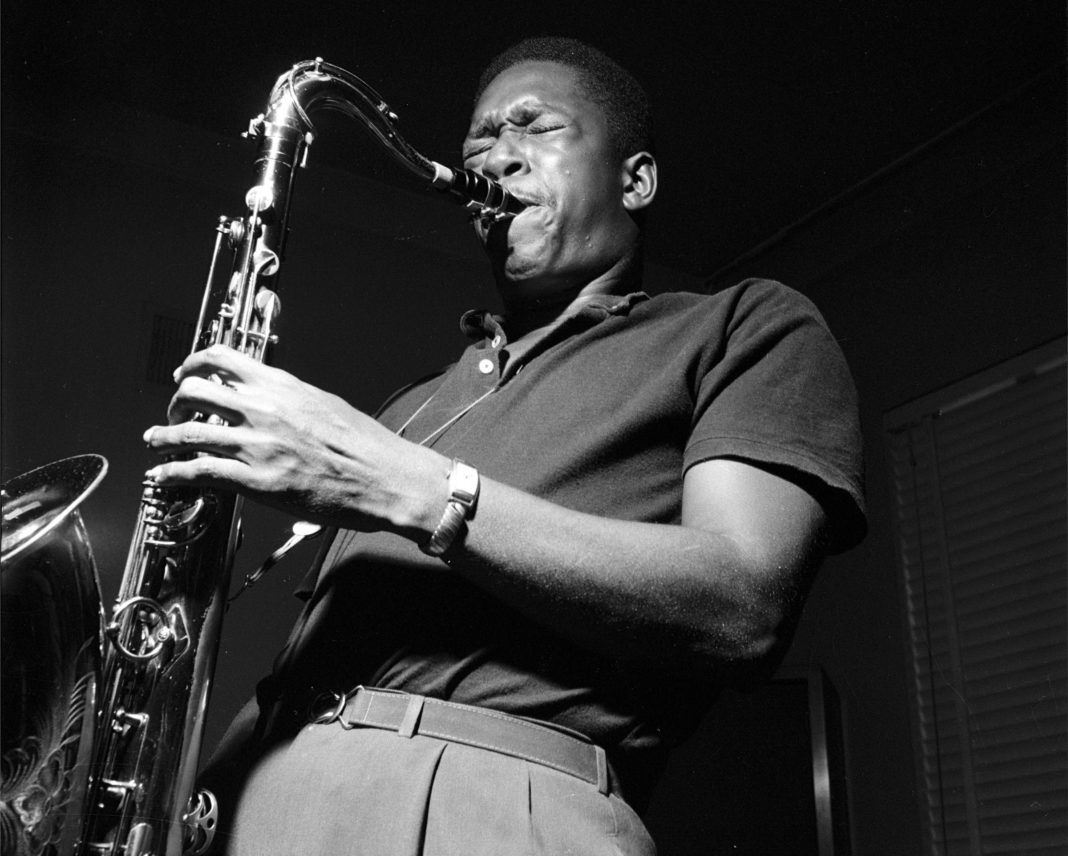When director John Scheinfeld embarked on a documentary about legendary jazz saxophonist John Coltrane, he knew the influence of the musician was broad. So he corralled President Bill Clinton, Oscar-winning artist Common, rock legend Carlos Santana and jazz sensation Kamasi Washington to talk about the man called “Trane.” He also landed Denzel Washington to voice the words of Coltrane for his film, Chasing Trane: The John Coltrane Documentary.
On Friday the Grammy Museum will open a nearly yearlong exhibit dedicated to Coltrane entitled Chasing Trane: John Coltrane’s Musical Journey Transcended. Opening night guests will also be treated to a screening of Scheinfeld’s film followed by a Q&A with the director.
John Coltrane was an innovator in the world of jazz. He was part of Miles Davis’s first quintet. He went on to record such landmark jazz albums as Giant Steps, Blue Train and the album considered to be his masterpiece, A Love Supreme. He died in 1967 from liver cancer at the age of 40
I spoke to Scheinfeld about the man, the myth and the music that is John Coltrane.
President Clinton talks early in the film about “using pain to elevate art.” Why do you think so many great artists, including Coltrane (who battled heroin addiction for part of his career), had to go through hell to become who they were and create what they did?
I think you can look at many great artists and see that out of their personal pain, whether it was something in their childhood, a relationship, whether it was someone not treating them fairly, it’s the pain that comes form that that really can create an emotional response that then comes out through their art. I think in Coltrane’s case it was his pain, but I think it was also his exploration of the universe. I don’t know many artists who claim Albert Einstein as an influence, but Coltrane did. Inside a man like John Coltrane you get the personal pain and experiences, but as a curious man you get all these thoughts and theories and ideas that interested him. All of that gets put together and gets put out as John Coltrane music.
Of all the things you learned about Coltrane, what surprised you the most?
I learned that John Coltrane was many things, but humorous does not seem to be one of them. I asked everyone that knew him, “tell me something really funny that he said to you or that he did,” and they really struggled and couldn’t come up with it.
What inspired you most about him?
How strongly he followed his musical instincts irrespective of what the commercial consequences might be. He followed his heart, his muse, to where the music would take him and it didn’t matter what contemporary trends were, what was selling or not, whether or not his fans would appreciate it or not. He stayed true to himself. I think that’s to be admired and that is also what makes a great artist.
On the heels of the overwhelming success of A Love Supreme, he went a completely different direction that alienated many of his fans. Do you think his making that choice, particularly at the Newport Jazz Festival paved the way for Miles Davis to do something like Bitches Brew?
By the time Coltrane embarked on what some people call his experimental period, others call it avant-garde; he was very influential in the world of jazz for so many people. I personally have not seen anything one way or another to be able to answer your question. We know that they had an older brother/younger brother relationship early on. We know that Miles had a great respect for Coltrane’s talent so that when he felt the drugs were getting in the way of the music he took the step of firing him. I would be really surprised if Miles was not tracking Coltrane’s career and tracking how his former band member was pushing the envelope of music. On the other hand, Miles is such a distinctive artist. It’s just as easy to say he didn’t need anyone to say how to expand his art. I think it’s a wonderful question, but I think there may not be an answer to it.
Coltrane said “I believe that man is here to grow to the fullest, the best that he can be.” Even though he died so young do you think he had achieved that by the time of his passing?
I think if Coltrane were here today and you asked him that question, I think his humble nature would be to say, “I’m working on it.” I don’t think he was someone who considered the journey completed. I think he was taken from us too soon. I think one can take a look at his life and say he lived it on his terms. He was on his musical journey. He was on his spiritual journey. He was on his personal journey. He was living with as much integrity as possible and he would probably readily acknowledge that.
I suppose one could make the argument he accomplished what he needed to and then passed on to the next realm. I’m one of those who look at this, as it was a life shortened. A life that could have accomplished so much more had he stayed with us.
Photo Credit: Francis Wolff/Mosaic Records
Chasing Trane: The John Coltrane Documentary is being released on Blu-Ray and DVD on Friday, November 17th. The soundtrack is also being released that date.










